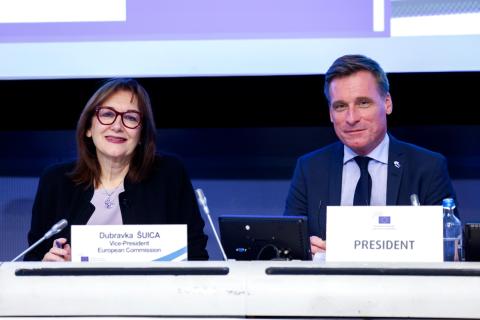European Economic
and Social Committee
Bringing citizens closer to the EU: EESC calls for a strategy on civil dialogue
In a debate with Commission Vice-President and Commissioner for Democracy and Demography Dubravka Šuica, the EESC called for a strategy on civil dialogue as a first step towards strengthening the role of civil society and increasing citizen participation in EU policy-making
The European Economic and Social Committee (EESC) is calling on the European institutions to step up the involvement of civil society in formulating policies and EU laws, making the voice of citizens better heard on issues that affect them.
Amid growing disaffection with traditional politics and rising populism, the EESC said that improving civil society and citizen participation in decision-making was a crucial component of European democracy and a prerequisite for the legitimacy of EU policies in the eyes of citizens, which has special importance ahead of the European elections.
In the debate with Commissioner Dubravka Šuica, linked to the adoption of its opinion on Strengthening civil dialogue and participatory democracy in the EU: a path forward, the EESC stressed the urgent need to step up the implementation of Article 11 of the Treaty of the EU (TEU), under which the institutions have a joint responsibility to ensure that organised civil society is actively involved in formulating EU laws.
Improving the implementation of Article 11 should be a follow-up to the Conference on the Future of Europe (CoFoE), a landmark initiative and major democratic exercise, which included a series of citizen-led debates on matters directly affecting the lives of European citizens.
We can all agree that citizens' voices must be heard beyond the ballot box. We in the EU institutions and bodies must all become better at involving civil society in meaningful dialogue, beyond mere information and consultation. As the house of organised civil society, the EESC provides the natural home for consultation and dialogue, and we stand ready to also play a role in the development of additional instruments of participatory democracy,
said EESC president Oliver Röpke.
"We need to ensure that citizens feel they have a stake in their democracy. For this to happen, they need to feel welcome in the civic space; they need to feel they have a chance to contribute, to be listened to and to make a difference. Belonging is an important part of this: belonging to a community, to a town, a country and also to Europe," vice-president Šuica said.
Building a more transparent, inclusive and democratic EU requires increased civic engagement and a strong partnership between the EU institutions and national governing bodies. "Our collective efforts will ensure that the EU remains a beacon of hope and a model of participatory democracy for the world," Ms Šuica stressed.
In the opinion, adopted at the plenary and requested by the Belgian Presidency of the Council of the EU, the EESC examined how to create a better system for people to participate directly in decision-making.
Co-rapporteur of the opinion Pietro Barbieri said that participative democracy was currently battling many problems such as the shrinking civic space, a lack of structured citizen participation and sporadic consultation of civil society on many issues.
With this opinion, the EESC is inviting the European institutions to take a concrete step forward: to adopt a strategy for civil dialogue, giving life to an action plan, and an interinstitutional agreement that involves every level of the EU. The EESC's commitment is a sign of an urgent need that cannot be renounced or postponed,
Mr Barbieri said.
Co-rapporteur Miranda Ulens said: We already have good practices for social dialogue. The proposals we make will ensure that the voice of other legitimate and representative organisations can be heard too. Let's create a real, democratic Europe for its citizens! #TogetherStrong!
The EESC is calling to make Article 11 TEU more effective by strengthening actors in the different EU institutions dealing with civil dialogue. Another proposal is to create an annual civil dialogue scoreboard which would trace and evaluate the quality of the EU's engagement with civil society, as well as an accreditation mechanism for civil society organisations.
As an established institutional voice of organised civil society at EU level, the EESC should be at the centre of civil society consultation and civil dialogue in general. It should have a stronger role in participatory democracy, and could serve as a potential hub for citizen panels, which is line with the CoFoE recommendations, the opinion stressed.
To gather input from civil society, the EESC will hold its inaugural Civil Society Week from 4 to 7 March. The results will feed into two resolutions on the European elections: the first will encourage people to vote and the second will focus on the expectations of civil society for the new European Commission and European Parliament mandate.
The EESC has already launched a pilot project to make the voice of young people better heard at EU level through the EESC, which it hopes can serve as a source of inspiration for the other institutions.
The Commission has developed many instruments to incorporate citizen participation in its policy-making processes. As a follow-up to the CoFoE, it has so far organised three citizens' panels which are becoming a regular feature of democratic life in the EU, with two more coming up. In December, it adopted the Defence of Democracy Package which included a recommendation aimed at increasing the participation of citizens and civil society in policy-making across all levels of governance, Ms Šuica said.
